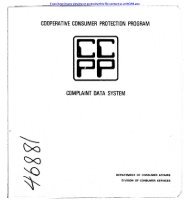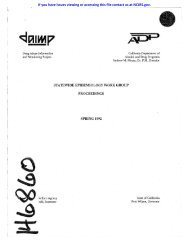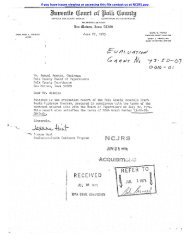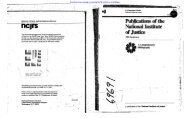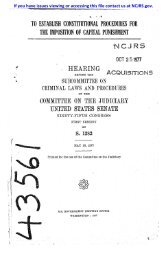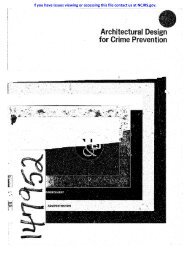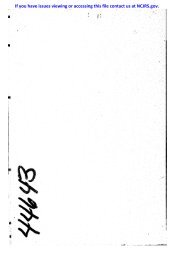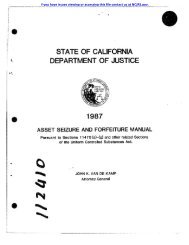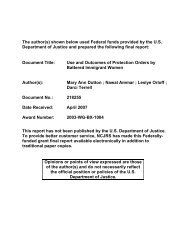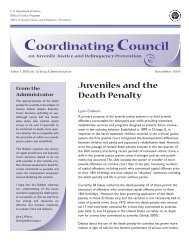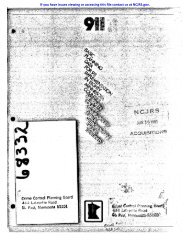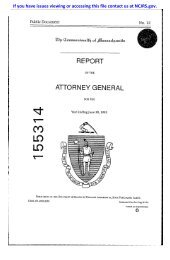0 - National Criminal Justice Reference Service
0 - National Criminal Justice Reference Service
0 - National Criminal Justice Reference Service
Create successful ePaper yourself
Turn your PDF publications into a flip-book with our unique Google optimized e-Paper software.
0<br />
The fourth Phase 1 objective is to obtain a better understanding/awareness of self by attending<br />
five therapeutic journaling classes in which the inmate is expected to maintain a da2y written<br />
journal and review in individual sessions. They are also expected to participate in individual<br />
counseling once a month and identify and review issues discussed during small group<br />
participation.<br />
The fifth objective is to obtain knowledge of interpersonal skills and group processes by<br />
attending 14 sessions of interpersonal skills classes, completing all homework assignments<br />
satisfactorily, and attending all small group therapy sessions 2 times per week.<br />
The sixth objective is to obtain knowledge of the basic concepts of recovery by attending 8<br />
sessions of the Basic Concepts of Recovery Class and obtaining a passing score on the test. The<br />
Basic Concepts class introduces basic vocabulary and concepts of addiction, treatment, recovery,<br />
and self-help programs, provides a foundation of key recovery and treatment concepts that will<br />
help participation into other therapeutic activities, develops an understanding of the depth of<br />
problems experienced by an individual who is a chemically dependent offender, confronts the<br />
complexity and depth of the recovery process so that they can understand a need for a full-time,<br />
long-term commitment to addiction treatment, aftercare, and recovery, and introduces and<br />
explains basic principles of the 12 Step Programs, self-help and the role of spirituality in the<br />
treatmentlrecovery processes.<br />
The seventh objective is to sustain recovery utiliziig 12 Step Support System by attending<br />
M A support group and completing requirements of a treatment plan supplement.<br />
The eighth objective is to utilize a Helping Measure System by initiating at least one encounter<br />
or one pull-up while in Phase I.<br />
The final objective is to advance to Phase I1 by having been successfully staffed, having<br />
received peer recommendation by means of a pop sheet, having maintained at least an average<br />
score on the Program Participation Index, having had functioned as a member of 2 different<br />
committee’s, having initiated a Phase I1 Treatment Plan, having obtained approval for Phase I1<br />
ITP fiom small groups and having each member give feedback for advancement to the next phase,<br />
having demonstrated understandinghe of recovery tools and giving a seminar on “What tools I<br />
learned in Phase I.”<br />
In Phase 11, the inmate enters into more focused psycho-educational programming, including<br />
interpersonal communication, criminal thinking, cognitive restructuring, and the relapse<br />
prevention. The inmate is also required to participate on 2 committees, be more actively involved<br />
in group therapy and the pull-up system. This phase involves several specific objectives according<br />
to the Phase I1 Treatment Plan.<br />
The first Phase I1 objective is for the inmate to obtain knowledge and begin to understand<br />
realistic self-examinatioditrapersonal skills. This objective is reached by attending the<br />
Intrapersonal Skills Training Class and by completing all the homework assignments to the<br />
satisfaction of the instructor. The inmate is expected to verbalize in small group therapy sessions<br />
what they were thinking at the time they committed their offense and to listen as others share<br />
what their thoughts were during their own experiences. The inmate is to identifL at least 3<br />
examples of behaviors, emotions, and thoughts which could trigger relapse, discuss these triggers<br />
with others in at least 9 small group sessions, and then review with their counselor in an individual<br />
session. To accomplish this objective, the inmate is expected to demonstrate mastery of<br />
assertiveness skills. They are to demonstrate this by listing 10 examples of aggressive behavior<br />
5<br />
This document is a research report submitted to the U.S. Department of <strong>Justice</strong>. This report has not<br />
been published by the Department. Opinions or points of view expressed are those of the author(s)<br />
and do not necessarily reflect the official position or policies of the U.S. Department of <strong>Justice</strong>.



